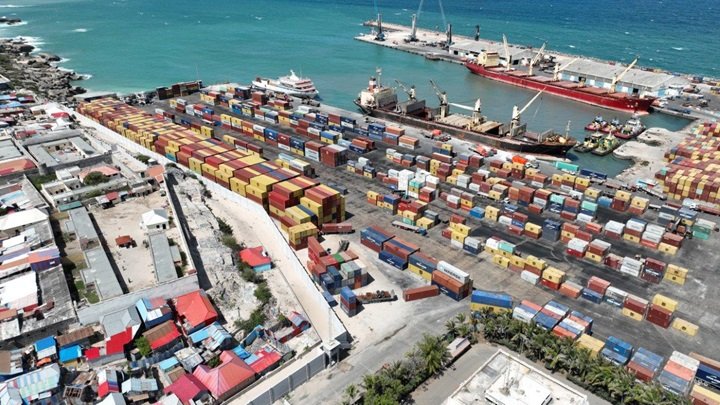By Abdullahi Ahmed Nor
Car importers in Mogadishu face a myriad of challenges, which have become increasingly burdensome due to systemic delays, excessive demurrage fees, and pervasive bureaucratic inefficiencies. The cause of this unwarranted delay is again the corruption of the government. A new company that has no prior experience in the field but linked to the presidential family has been awarded the contract of number plates in unscrupulous way.

The old company that has the experience found their contract cancelled without any justification and as a result took away all their plate making equipment including the number plates. The unfortunate traders are waiting over two months for the new company to establish itself in the unknown field they were illegitimately given to make out cursed money and only God can tell when they will deliver services to the Mogadishu motor traders These issues not only strain the finances of traders but also impact the broader economy, causing significant discontent within the business community.
Prolonged Delays and the Waiting Game
One of the most pressing issues for car importers in Mogadishu is the prolonged delay in processing the necessary paperwork to release imported vehicles from the port. Despite paying all required taxes and fees, importers often wait for months to receive the number plates needed to legally operate their vehicles. These delays are attributed to a combination of administrative inefficiencies, corruption, and a lack of streamlined processes within the relevant government departments.
The bureaucratic red tape that importers must navigate is exacerbated by inconsistent enforcement of regulations and the frequent turnover of government officials, leading to confusion and further delays. Importers find themselves at the mercy of a system that seems to prioritize obstruction over efficiency, leaving their vehicles to sit idle at the port while costs continue to mount.
Crippling Demurrage Fees
As vehicles languish in the port awaiting clearance, importers are saddled with daily demurrage fees—charges imposed for the storage of goods beyond the agreed-upon free period. These fees can quickly accumulate, often reaching exorbitant levels that significantly erode the profit margins of importers. In many cases, the demurrage fees end up costing more than the taxes and initial importation costs combined.
The inability to secure prompt release of vehicles means that importers are effectively penalized for the government’s inefficiencies. This has led to widespread frustration, with many traders feeling that they are being unfairly targeted by a system designed to extract as much revenue as possible from their operations.
Bureaucratic Hurdles and Corruption
The bureaucratic hurdles faced by car importers are compounded by corruption, which is rampant within the customs and port authorities. Bribery is often required to expedite the processing of documents or to ensure that vehicles are not subjected to additional, arbitrary inspections. Those who cannot or will not pay these bribes often find their vehicles subjected to even longer delays, further increasing the financial strain.
The lack of transparency and accountability within the customs system has created an environment where corruption thrives, and where legitimate business operations are constantly undermined by the need to navigate a corrupt and inefficient system. This not only hampers the operations of car importers but also discourages foreign investment and trade, as the risks associated with doing business in Somalia become too great for many potential investors.
Economic Impact and Broader Consequences
The plight of car importers in Mogadishu has broader economic implications. The delays and additional costs associated with importing vehicles can lead to higher prices for consumers, reducing the affordability of cars for ordinary Somalis. This, in turn, affects other sectors of the economy, such as transportation and logistics, which rely on a steady supply of vehicles to operate efficiently.
Moreover, the inefficiencies within the customs and port authorities contribute to a perception of Somalia as a difficult place to do business, deterring potential investors and stifling economic growth. The ongoing challenges faced by car importers are emblematic of the wider issues within Somalia’s trade and regulatory environment, which must be addressed if the country is to achieve sustainable economic development.
Calls for Reform
There have been increasing calls from the business community and civil society for the Somali government to address these issues by reforming the customs and port authorities, streamlining processes, and cracking down on corruption. While some steps have been taken in this direction, progress has been slow, and many importers remain skeptical that meaningful change will occur.
Until these reforms are implemented, car importers in Mogadishu will continue to face an uphill battle, struggling against a system that seems designed to exploit their vulnerability rather than support their business endeavors.
Conclusion
The situation at Mogadishu port highlights the broader challenges of bureaucracy, inefficiency, and the impact of these issues on Somalia’s business environment. As the country continues its efforts to rebuild and develop, addressing these challenges will be crucial for ensuring that the private sector can thrive and contribute to Somalia’s economic growth.
To restore confidence in government such administer failure must call for some heads to roll such as, among many, the Director General of the Ministry of Transport and the Minster of Transportation. Had the previous forward planner, Director General, Mr. Ali Ga’al, was in place, this sham wouldn’t have occurred.
Abdullahi Ahmed Nor
Email: abdullahinor123@gmail.com

Leave a Reply